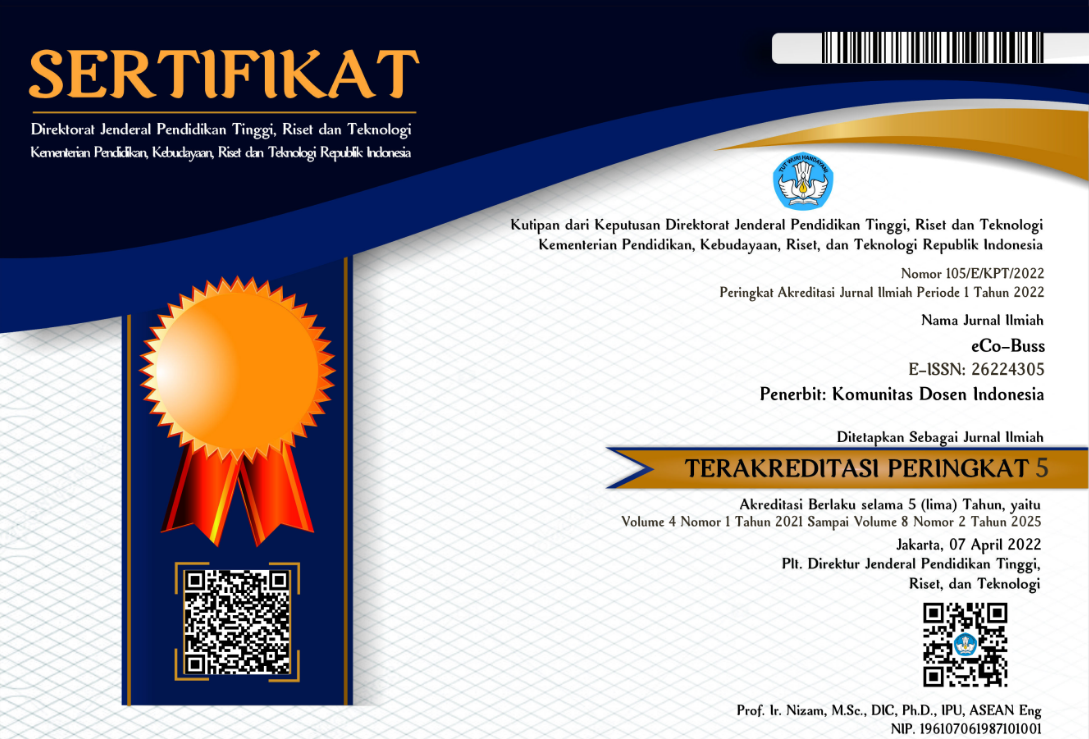Analisa Dampak Intrinsic & Extrinsic Reward, Employee Perceived Training Effectiveness Dan Leadership Terhadap Perfoma Karyawan Yang Dimediasi Oleh Motivasi Karyawan Pada Agen Asuransi Kota Batam
DOI:
https://doi.org/10.32877/eb.v5i1.333
Keywords:
employee perceived training effectiveness, employee performance, extrinsic reward, intrinsic reward, leadership
Abstract
Kinerja karyawan menjadi aspek penting yang harus dikembangkan untuk kepentingan kemajuan organisasi/perusahaan. Salah satunya seperti yang dialami agen kerja asuransi di Kota Batam yang mengalami penurunan kualitas kinerja karyawan. Hal ini disebabkan kurangnya semangat , kesadaran diri pekerja, serta pengaruh lingkungan internal maupun eksternal perusahaan sehingga memerlukan upaya peningkatan dari beberapa faktor seperti motivasi, penghargaan intrinsik dan ekstrinsik, pelatihan karyawan, serta adanya sikap kepemimpinan. Secara eksplisit tujuan penulisan artikel bertujuan untuk mengetahui pengaruh dari Motivation, Intrinsic & Extrinsic Reward, Employee Perceived Training Effectiveness dan Leadership terhadap Employee Performance agen kerja asuransi di Kota Batam. Penelitian menggunakan pendekatan metode kuantitatif dan kualitatif dengan uji data validitas, uji reliabilitas, serta uji hipotesis. Adapun hasil penelitian diperoleh yaitu seluruh pengaruh dari beberapa variabel yang digunakan seperti Motivation, Intrinsic & Extrinsic Reward, Employee Perceived Training Effectiveness dan Leadership memiliki nilai positif dan signifikan berdampak pada peningkatan dan perubahan terhadap Employee Performance di agen kerja asuransi Kota Batam
Downloads
References
Anjam, M. a. (2016). Impact of leadership style on employee's loyalty. Gulf-Pacific Journal of Business Administration 1, no. 2, 164-177.
Anjum, N. M. (2021). Do intrinsic rewards matter on motivation? Evidence from primary school teachers of Bangladesh. SEISENSE Journal of Management 4, no. 1, 47-58.
Balouch, R. a. (2014). Determinants of job satisfaction and its impact on employee performance and turnover intentions. International Journal of Learning & Development 4, no. 2 , 120-140.
Ciobanu, A. A. (2019). An integrated psycho-sociological perspective on public employees’ motivation and performance. Frontiers in Psychology 10, 36.
Ezenwakwelu, C. A. (2017). Determinants of Employee Motivation for Organizational Commitment. IOSR Journal of Business and Management 19, no. 7, 1-9.
Khan, A. A. (2016). Impact of training and development of employees on employee performance through job satisfaction: A study of telecom sector of Pakistan. Business Management and Strategy 7, no. 1, 29-46.
Nazir, O. a. (2017). Enhancing organizational commitment and employee performance through employee engagement: An empirical check. South Asian Journal of Business Studies, 98-114.
Nzyoka, C. M. (2016). The relationship between Total compensation and employee performance in the insurance industry, case of Mayfair insurance company limited. Psychology and Behavioral Sciences 5, no. 1, 20-36.
Olusadum, N. J. (2018). Impact of Motivation on Employee Performance: A Study of AlvanIkoku Federal College of Eduaction. sigma 1, no. 1 , 53.
Rony, N. I. (2017). Modelling the relationships between internal marketing factors and employee job satisfaction in oil and gas industry. Asian Social Science 13, no. 3, 135.
Sendawula, K. S. (2018). Training, employee engagement and employee performance: Evidence from Uganda’s health sector. Cogent Business & Management 5, no. 1, 1470891.
Shahzadi, I. A. (2014). Impact of employee motivation on employee performance. European Journal of Business and Management 6, no. 23, 159-166.
Sitzmann, T. a. (2019). Approaching evaluation from a multilevel perspective: A comprehensive analysis of the indicators of training effectiveness. Human Resource Management Review 29, no. 2, 253-269.
Downloads
Published
How to Cite
Issue
Section
License
Copyright (c) 2022 Jesen Jesen

This work is licensed under a Creative Commons Attribution-ShareAlike 4.0 International License.






 DOI :
DOI :
 Abstract views: 375
/
Abstract views: 375
/  PDF downloads: 368
PDF downloads: 368

